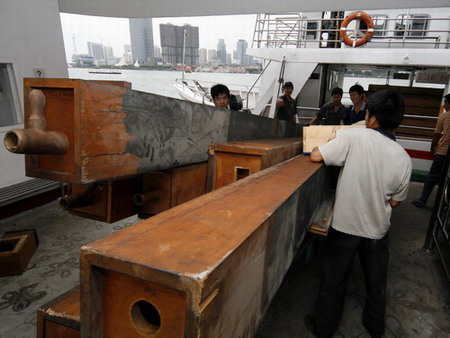The new part of the museum will face the sea and have a full glass wall in its front side, through which people can view the front side of the huge pipe organ from outside.
"I am eager to play that huge instrument. It must be an exceptional experience," said Fang, a Gulangyu native graduated from the Music Department of Xiamen University.
|

In this October 9, 2007 file photo, workers try to unload the Norman & Beard pipe organ, disassembled, upon its arrival in Xiamen, east China's Fujian province. [Xinhua]
|
Every year, the museum will hold six to seven pipe organ concerts and occasionally Fang plays for museum visitors as well.
Although learning playing piano since very young, she prefers pipe organs.
"This instrument is amazing. When playing piano, I feel it is under my control. But, for a pipe organ, I give up myself to it," she said. "Not many can play a real pipe organ in China. I really cherish the opportunity."
The person who gave her the chance was Hu Youyi, a famous piano collector.
All organs in the museum were Hu's collection. He also donated his piano collection, about 150 pieces, to the Gulangyu Piano Museum, on the same island as the Organ Museum.
Born in 1936 on Gulangyu island, he studied in the Royal Conservatory in Brussels, majored in pipe organ and piano, in the 1960s.
"There was a musical instrument museum near my college. I was impressed by the keyboard instruments there. They are not only beautiful objects but also a record of music history. From then on, I dreamed of my own collection," he told Xinhua in an interview during his short stay on Gulangyu. He now lives in Melbourne, Australia.
He started collecting pianos after settling in Australia in 1974 and building a house, big enough to hold 30 pianos.
"It was at first just my personal interest but, in 1998, when I returned my hometown, I got an idea of setting up a museum here and have more people enjoy them," Hu said.
In 2000, the Piano Museum opened with his donation. When more old pianos were brought to the museum, Hu turned to pipe organs.
"I have always loved the sound of pipe organs. In the West, many pipe organs were moved away from churches because of different reasons. Some of them remained in a very good condition. It is a pity that their wonderful sound can no longer be heard," he said.
Although few people collected pipe organs because of their huge size, Hu decided to make the first step.
In 2004, he bought the Norman & Beard from England and in 2007 the Casavant Freres from the Emmanuel Church in Boston.
"The wood case of the Casavant Freres is an artwork itself," he said.
He expects to provide a new home for more old pipe organs but where to put them is still his top problem.
"I really admire people of Gulangyu for taking them in," he said. "I hope one day organ lovers from all over the world will come on a music pilgrimage here."

